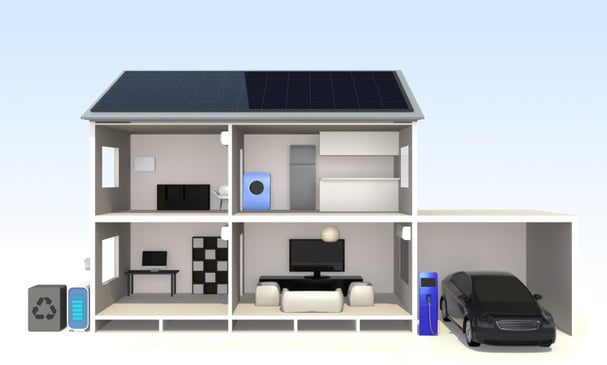This article first appeared on Japan Industry News.
Protecting the environment, conserving energy and reducing carbon emissions are global challenges. In Japan too, various sectors, including the government, are aggressively addressing these difficult issues.

The Japanese government has recently introduced a variety of measures to reduce energy consumption at home, in order to promote energy conservation by the household sector.
Among these measures are the introduction and development of Smart House and Home Energy Management System (HEMS) technologies, which have recently been making rapid progress.
It is expected that HEMS devices will come into wide use and that their market will expand greatly, if the necessary communication technologies and an evaluation system for these technologies are established in an appropriate time frame.
Following our previous article on the deregulation of electricity in Japan, I will discuss specific energy-conservation technologies and the measures taken and planned by the Japanese government.
Energy Consumption Continues to Decrease in Japan
On April 15, 2016, the Agency for Natural Resources and Energy released a report on Japan’s energy supply and demand situation for fiscal 2014. Efforts have been made to promote energy conservation after the shutdown of all the nuclear power plants in Japan in 2011.
The report revealed that overall energy consumption in Japan had decreased continuously since the Great East Japan Earthquake in 2011.
- Energy consumption decreased for four consecutive years, with a reduction of 3.2 percent from 2013 to 2014
- Energy consumption decreased in all these three sectors: industrial, household, and transportation.
Breaking the data down by sector, industry used 63 percent of the total energy consumed, transportation took 23 percent, and households consumed 14 percent. The final energy consumption decreases from 2013 to 2014 for each sector were 3.0 percent, 3.4 percent and 3.8 percent, respectively, on a year-on-year basis.

Chart: Prepared from information on the Agency for Natural Resources and Energy website
Thanks to the energy conservation efforts of the business and private sectors and various measures taken by the government to encourage energy transitions, 2014’s carbon emissions decreased by 3.7 percent. This marked the first decrease from the previous years after continuous increases since 2011.
Introduction of Smart House to Promote Energy Conservation by the Household Sector
In July 2015, the Ministry of Economy, Trade and Industry (METI) established the “Subcommittee on the Long-term Energy Supply & Demand Outlook – To Deliberate the Energy Mix for Japan” with a view to transform Japan’s energy mix by 2030. It is expected that the establishment of the Subcommittee will promote energy conservation and better energy management by the household sector.
Smart House technology is one means of conserving energy that can contribute to household sector savings.
A Smart House is a residence where energy consumption is optimized by the application of information technology (IT). A more specific form of such a dwelling is one that has energy-generating equipment, including a PV power generating system and storage batteries, with electrical appliances, lights and systems such as heating and air conditioning capable of communicating with one-another.
Such a home can be controlled efficiently through an energy management system, with one of the goals being to achieve reductions in carbon emissions.
For more information on our Smart Grid Product Testing solution, please visit our website or contact us to speak to one of our experts.

Our latest Expert Column by Frank Piller, Product Certification Expert at TÜV Rheinland Japan provides you with a deeper understanding of the situation in Japan..



